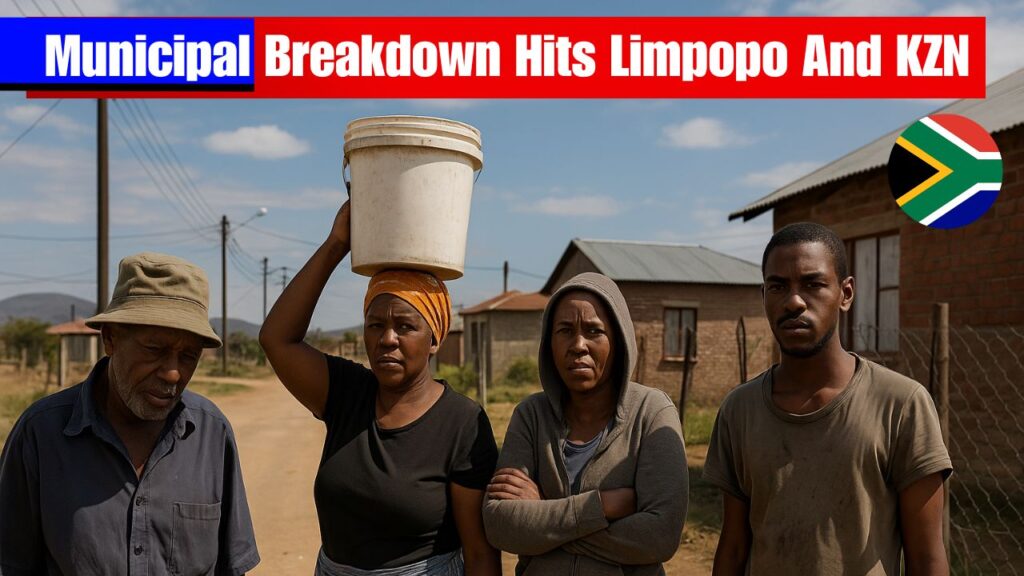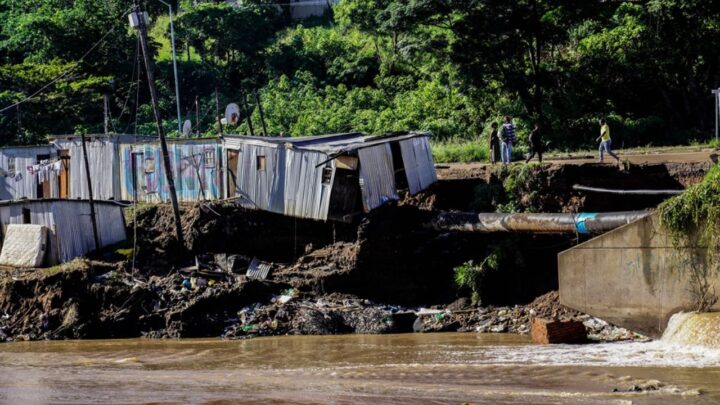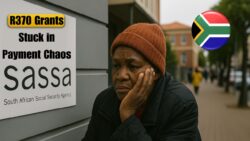South Africa is facing a major municipal collapse as multiple towns across Limpopo and KwaZulu-Natal (KZN) struggle to maintain essential services like electricity and water. This alarming situation has left thousands of residents in the dark, literally and figuratively. The root causes include financial mismanagement, aging infrastructure, unpaid Eskom bills, and poor governance. With entire communities experiencing daily blackouts and dry taps, the crisis has triggered widespread concern and urgent calls for government intervention. This breakdown in basic service delivery is not just a local issue—it reflects deeper systemic problems in municipal leadership and infrastructure investment across the country.

Worsening Utility Crisis Across South African Municipalities
Points:
- Many municipalities owe millions to Eskom and water boards.
- Frequent load shedding and water supply disruptions are common.
The situation in Limpopo and KZN is a reflection of a broader crisis gripping South African municipalities. Many local governments are crippled by massive debts to Eskom and water utility companies, which has led to service disconnections. Municipalities like Polokwane, Thohoyandou, and parts of eThekwini are reporting severe load shedding far worse than the national schedule. The failure to invest in infrastructure maintenance and upgrades has worsened the impact, causing transformers to blow out and water treatment plants to fail. Residents are left without warning, sparking protests and legal action against local governments. Without immediate restructuring, the collapse may spread to other regions soon.
Financial Mismanagement Deepens the Limpopo and KZN Service Crisis
Points:
- Misuse of public funds has led to bankruptcy-level conditions.
- Auditor General reports widespread irregular spending and lack of controls.
Financial mismanagement is a key driver behind the municipal collapse in Limpopo and KZN. According to reports by the Auditor General, many municipalities have failed audits due to irregular expenditure and a lack of internal financial controls. In several cases, money allocated for infrastructure maintenance or utility payments was diverted or misused, leaving service providers unpaid. This has led Eskom and water boards to cut off supply to municipalities in default. The lack of skilled staff, coupled with corruption and political interference, has made recovery even more difficult. These financial troubles are not isolated and highlight a need for stronger oversight at the provincial and national levels.
Impact on Local Communities and Health Systems in Limpopo & KZN
Points:
- Hospitals and schools face power outages and lack of running water.
- Daily life is disrupted as businesses and homes operate without essentials.
The most heartbreaking consequence of this municipal collapse is its impact on everyday citizens. In both Limpopo and KZN, hospitals have reported backup generator failures, making it difficult to perform surgeries and store medicine. Schools are operating without running water or reliable electricity, endangering hygiene and learning. Businesses are shutting down or relocating due to operational challenges, further damaging the already weak local economies. Elderly and disabled residents are disproportionately affected, particularly in rural towns where service restoration is slow or nonexistent. South Africans in these regions are now demanding accountability, and some communities are taking legal action against their local governments.

Government Response and Possible Recovery Steps for South Africa
Points:
- National Treasury and Department of Cooperative Governance have issued warnings.
- Talks of administrative intervention and conditional grants are underway.
The South African government has acknowledged the severity of the municipal collapse in Limpopo and KZN. The National Treasury has threatened to withhold funding unless urgent reforms are made, while the Department of Cooperative Governance and Traditional Affairs (COGTA) is reviewing the possibility of placing failing municipalities under administration. Conditional grants and infrastructure recovery packages are being considered for affected towns. However, experts argue that without transparency, skilled staff, and political will, these measures may fall short. Residents are hopeful but skeptical, having witnessed years of empty promises. What’s clear is that immediate and decisive intervention is the only path to restoring services and public trust.
| Area | Issue | Impact | Responsible Authority |
|---|---|---|---|
| Polokwane (Limpopo) | Unpaid Eskom bills | Blackouts 8–12 hrs/day | Municipality + Eskom |
| eThekwini (KZN) | Pump station failure | No running water | Municipality + Water Board |
| Thohoyandou (Limpopo) | Transformer damage | Entire ward blackouts | Local Govt |
| Ugu District (KZN) | Non-payment to Umgeni Water | Water cuts 3x a week | District Municipality |
| Phalaborwa (Limpopo) | Infrastructure collapse | Sewage overflow & outages | Municipality |
Frequently Asked Questions (FAQs)
1. Which towns are affected by the municipal collapse in South Africa?
Towns in Limpopo and KZN like Polokwane, Thohoyandou, and eThekwini are severely affected.
2. What is the main cause of service failures in these municipalities?
The primary causes include financial mismanagement, unpaid utility bills, and poor infrastructure.
3. What is the government doing to address the crisis?
The government is considering administrative takeovers and emergency funding for recovery.
4. How are local communities coping with the situation?
Communities are organizing protests, using water tanks, and relying on generators for power.





